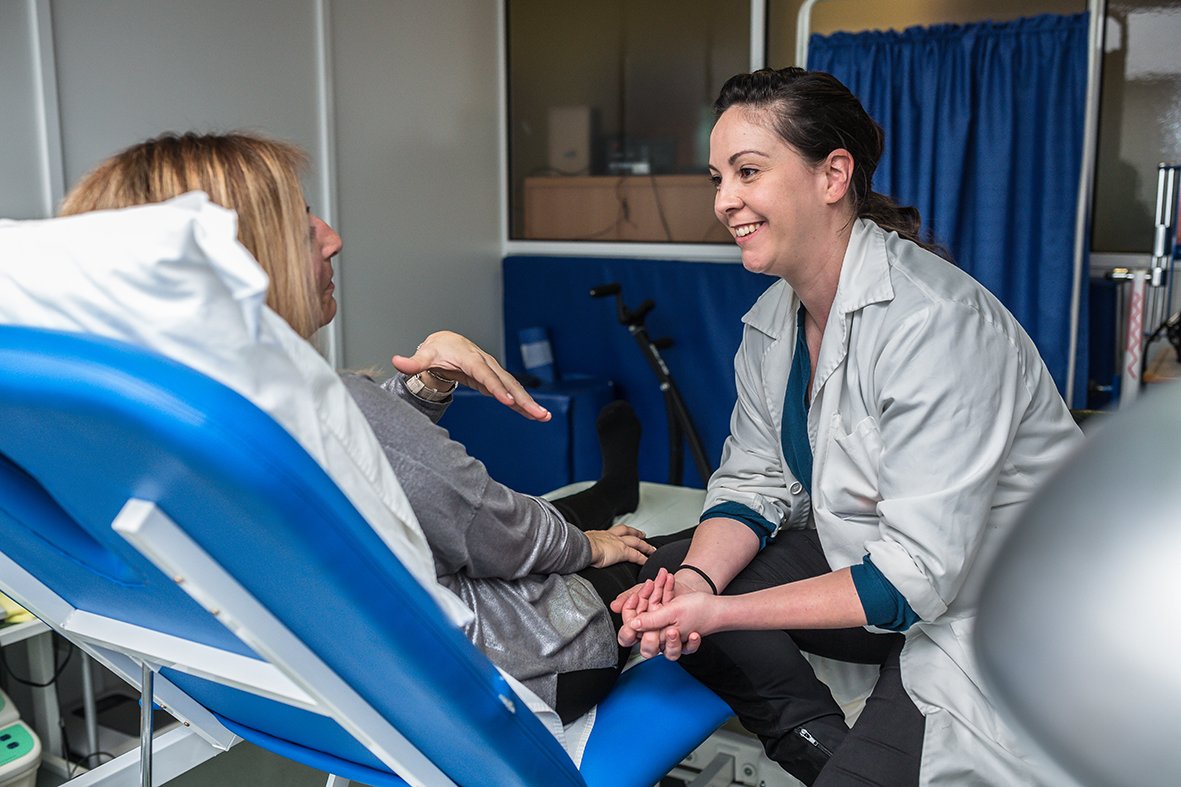Virginia Beatriz Peralta Jaquero, “la Caixa”-CUDECA EAPS psychologist
How long have you been in EAPS?
Although I started my training in this field earlier, my path in Psycho-oncology and Palliative Psychology began in 2006. Since then, I have worked as a palliative psychologist in various psychological, oncology and palliative care teams in different autonomous communities in Spain, in hospitals, at home and in medium-long stay palliative care units. In relation to the "la Caixa" programme of Comprehensive Care for Advanced Illnesses, I have been a member of various Psychological and Social Care Teams since the start of its implementation in December 2008.
What is your current work?
I am one of the palliative psychologists on the Psychological and Social Care Team of the Cudeca Foundation. I currently work in Cudeca Foundation's Admissions Unit, in a Home Care Team in Malaga city and in Outpatients. I have also worked in the Day Care Unit, whose activity is currently suspended due to extension work.
As far as my work is concerned, a Palliative Care Psychologist is a "professional psychologist, integrated in an interdisciplinary palliative care team, who actively attends to the psychological needs of people of any age with health-related suffering due to a serious illness, especially at the end of life. Its aim is to minimise psychological distress and promote the quality of life of patients, relatives and/or carers during the process of illness and bereavement, as well as research, teaching, advice and support for the rest of the professionals in the care team in these aspects. All of this, from the perspective of Health Psychology, a non-pathological approach, centred on the promotion of health through prevention, early identification, comprehensive and continuous assessment, symptom control and addressing psychological and/or spiritual-existential suffering ".
In short, the professional work of a Palliative Care Psychologist focuses on the care of patients, their families and the healthcare team, as well as teaching and research.
For you, what has psychological and social care meant for both patients and their families in the "la Caixa" programme of Comprehensive Care for Advanced Illnesses?
The "la Caixa" programme of Comprehensive Care for Advanced Illnesses has given a boost to psychological and social care in palliative care in Spain. Palliative care began to be developed in Spain in the 1980s, with the participation of psychology professionals dedicated to health care2. However, in the constitution of most palliative care teams, despite being considered essential, the figure of the psychologist is not integrated on a par with other health professionals. Thus, before the start of the Programme, when we spoke of palliative psychological care resources, the calculations were per million inhabitants, with the total number of palliative psychology professionals in Spain barely exceeding one hundred5. After December 2008, with the start of the "La Caixa" Foundation Programme, more than a hundred such professionals were incorporated into palliative care in various autonomous communities. Since then, the number of psychologists in palliative care teams has progressively increased until they have been introduced in all the provinces of Spain. Thanks to this, we can now speak of a rate of palliative psychology professionals per 100,000 inhabitants. Although the figures are still far from what is needed and there is still a long way to go to facilitate access to quality palliative psychological care for the entire population, it is important to appreciate and be grateful for the qualitative leap that the Programme has made for the care of thousands of people affected by an advanced illness and for their families. In addition to less suffering for the patient, family and team, attending to the psychological needs implies an improvement in the quality of care by promoting comprehensive care.
For all these reasons, it is a privilege for me to have participated in the programme since its inception.
I don't want to end without thanking each and every colleague with whom I have had the opportunity to work since 2006, with all the learning and experience that teamwork entails. I consider myself very fortunate for the professional path I have travelled with each team and I am proud to have the references I have. Finally, and most importantly, my special thanks to each and every one of the people I have had the opportunity to work with for being the best teachers. Thank you for all your teachings, your transmission of knowledge, your love, doubts, fear, pain, growth, personal resources, shared stories of life and suffering. Thank you for the motivation you give me every day to continuously train, research and look for the most effective ways to accompany you. Thank you for allowing me the honour of being by your side at such an important time in your lives.
Referenced citations:
Jamal I and Peralta V. (2019). The professions in palliative care: Who is the psychologist in palliative care? Professions: 179, 15.
Limonero JT. (2016). Brief history of palliative psychology in Spain. In: Barbero J, Gómez-Batiste X, Maté J, Mateo D (coordinators). Manual para la atención psicosocial y espiritual a personas con enfermedades avanzadas Intervención psicológica y espiritual (pp. 65-73) Barcelona: Obra Social "La Caixa".
Bayés R (2006). Psychological intervention in palliative care. Infocop.



